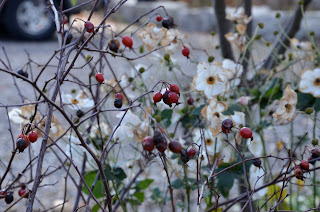A strangely gorgeous day for November...17 degrees and sunny.
It is time to put the bees to bed for the winter...not that they go to sleep but the hives need to be prepared. We put burlap on the lattice wall to the west of the hives to protect them from the north wind that whistles up our property. They have a shed behind them and a wooden fence on the other side so I think they are good to go. Their entrances face south so when there is a bit of sun in the winter they can come out and do some cleansing flights. I also had to take the top supers off each hive to make them a bit smaller. That way the bees will not spread out too much and get chilled. Each hive was four boxes high and I wanted them to be only three boxes high.
I opened up Hippolyta first, and yes, I was completely protected in my bee suit and I had a lit smoker, in case you are concerned. The bees were all at the top of this hive. To look at the frames, I had to brush tons of bees off each frame or shake them off. The air was full of bees. They weren't terribly angry but they did bump me a bit. I emptied the box of frames. There were two fully capped frames of honey and the rest were about half full.
I then went to Queen Elizabeth I. All her bees were at the bottom so I didn't have as much work to clear the frames. So strange how different the two hives are from one another. The bees ignored me completely. There were five fully capped frames of honey in the top box. I took all the fully capped frames into the house for extracting and saved the rest for the bees. I will give the frames back to the hives in the spring. I left about 75 pounds of honey in each hive for them to eat over the winter. That is more than I extracted over the summer! I don't want to have to feed them any sugar syrup in the spring so I am hoping that I left enough. Everything I read tells me that honey is better for them than sugar syrup.
Bill made reducers for the top entrances of the hives to keep the bees cosy and as soon as it gets colder I will shut down the bottom entrances completely. So as not to confuse the bees, I will do it at night time and then place a branch in front of each hive. The bees will come out and notice that all is not what it once was and re-orient themselves. This means they will fly out, turn around and look back at the hive, re-adjust their internal gps, to know where the new entrance is. If they just fly out without noticing the change, they will come back to the old entrance and flail about wondering what happened...like absent minded professors!
It is so warm right now that the bees are still bringing pollen home. This is great since pollen is their protein and they need protein to raise the brood in the spring. I am close to leaving them to their own devices. I have decided that I will not give my bees any chemicals and/or antibiotics. This means that if they get mites of any sort or viruses, they are on their own. I would rather lose the bees than have chemicals stored in the wax which is where the honey is stored. They will have to become tough bees on their own. I am pretty sure that I have tough bees...especially with that new black queen with the white stripe. She looks like a fighter to me!
I extracted the honey from the seven frames. It is a darker, rich honey with a slightly bitter after-taste...probably the golden rod. So that's the last honey until next season. It has been a sticky, sweet adventure.
Here are the last bits of colour in the garden as we move towards winter.
 |
| Red blaze maple |
 |
| Rosehips with Japanese anemone in background |
 |
| Backlit birch leaves |
 |
| One last coreopsis bloom |
 |
| Monkshood bloom |
And on another, slightly dorkier note! The Ontario Beekeepers Association had a photo contest for a
picture for the month of July in their 2012 calendar. I had taken a picture of a just extracted comb of honey on my iPhone and decided to send it in for the contest...and I won! My great prize is a copy of the calendar but I am happy to tell people that I am Miss July!
 |
| Award winning photo of honey comb |
So wish me and the girls good luck for the winter.
No comments:
Post a Comment